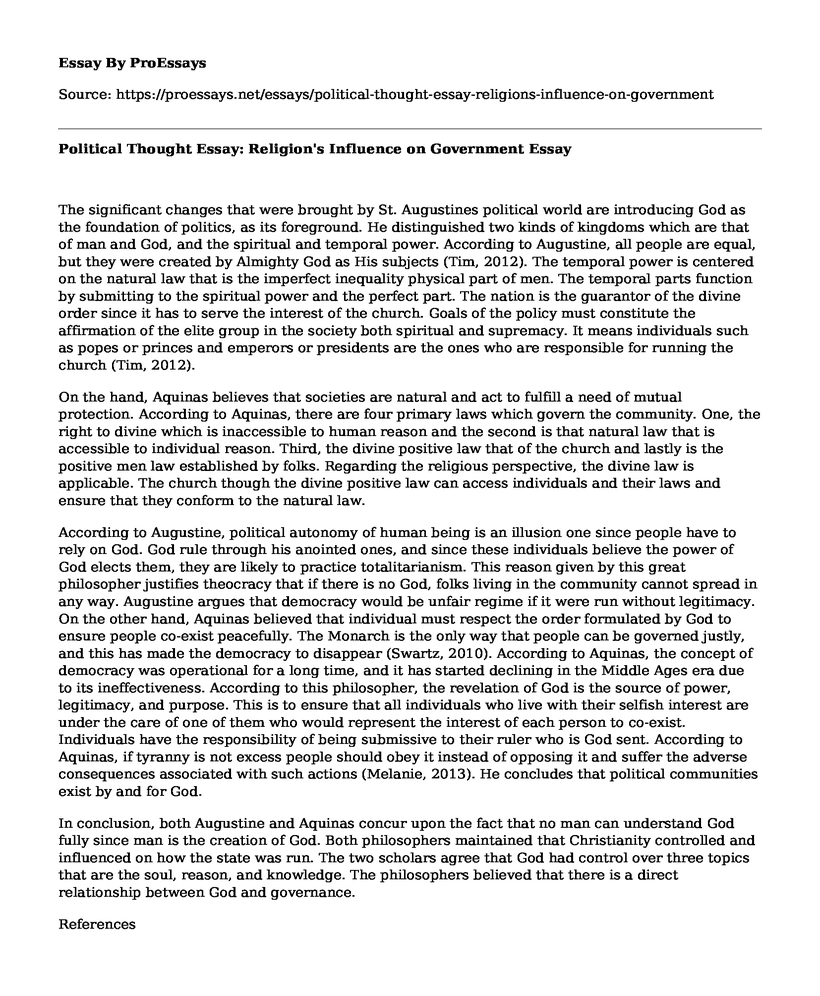The significant changes that were brought by St. Augustines political world are introducing God as the foundation of politics, as its foreground. He distinguished two kinds of kingdoms which are that of man and God, and the spiritual and temporal power. According to Augustine, all people are equal, but they were created by Almighty God as His subjects (Tim, 2012). The temporal power is centered on the natural law that is the imperfect inequality physical part of men. The temporal parts function by submitting to the spiritual power and the perfect part. The nation is the guarantor of the divine order since it has to serve the interest of the church. Goals of the policy must constitute the affirmation of the elite group in the society both spiritual and supremacy. It means individuals such as popes or princes and emperors or presidents are the ones who are responsible for running the church (Tim, 2012).
On the hand, Aquinas believes that societies are natural and act to fulfill a need of mutual protection. According to Aquinas, there are four primary laws which govern the community. One, the right to divine which is inaccessible to human reason and the second is that natural law that is accessible to individual reason. Third, the divine positive law that of the church and lastly is the positive men law established by folks. Regarding the religious perspective, the divine law is applicable. The church though the divine positive law can access individuals and their laws and ensure that they conform to the natural law.
According to Augustine, political autonomy of human being is an illusion one since people have to rely on God. God rule through his anointed ones, and since these individuals believe the power of God elects them, they are likely to practice totalitarianism. This reason given by this great philosopher justifies theocracy that if there is no God, folks living in the community cannot spread in any way. Augustine argues that democracy would be unfair regime if it were run without legitimacy. On the other hand, Aquinas believed that individual must respect the order formulated by God to ensure people co-exist peacefully. The Monarch is the only way that people can be governed justly, and this has made the democracy to disappear (Swartz, 2010). According to Aquinas, the concept of democracy was operational for a long time, and it has started declining in the Middle Ages era due to its ineffectiveness. According to this philosopher, the revelation of God is the source of power, legitimacy, and purpose. This is to ensure that all individuals who live with their selfish interest are under the care of one of them who would represent the interest of each person to co-exist. Individuals have the responsibility of being submissive to their ruler who is God sent. According to Aquinas, if tyranny is not excess people should obey it instead of opposing it and suffer the adverse consequences associated with such actions (Melanie, 2013). He concludes that political communities exist by and for God.
In conclusion, both Augustine and Aquinas concur upon the fact that no man can understand God fully since man is the creation of God. Both philosophers maintained that Christianity controlled and influenced on how the state was run. The two scholars agree that God had control over three topics that are the soul, reason, and knowledge. The philosophers believed that there is a direct relationship between God and governance.
References
Melanie, D. (2013). Augustine and Aquinas. Retrieved from https://atanystreetcorner.wordpress.com/2013/07/23/augustine-v-aquinas/
Swartz, N. (2010). Thomas Aquinas: on law, tyranny, and resistance. Retrieved from http://www.scielo.org.za/scielo.php?script=sci_arttext&pid=S1015-87582010000100009
Tim (2012). The power of Visualization. Retrieved from http://www.the-philosophy.com/thomas-aquinas-saint-augustine
Cite this page
Political Thought Essay: Religion's Influence on Government. (2021, Apr 08). Retrieved from https://proessays.net/essays/political-thought-essay-religions-influence-on-government
If you are the original author of this essay and no longer wish to have it published on the ProEssays website, please click below to request its removal:
- A Visit to the Hindu Temple - Religion Essay Example
- Social Determinants of Health, Poverty and Christian Views Essay
- Documentary Analysis Essay on Park Avenue: Money, Power and the American Dream
- NASA Investment: Essential for America's Superpower Status - Essay Sample
- Paper Example on State Shouldn't Interfere in Consensual Relationships between Adults Over 21
- Essay Example on God's Calling: My Life in God and Christian Living
- Michael Luther King Jr - Essay Sample







